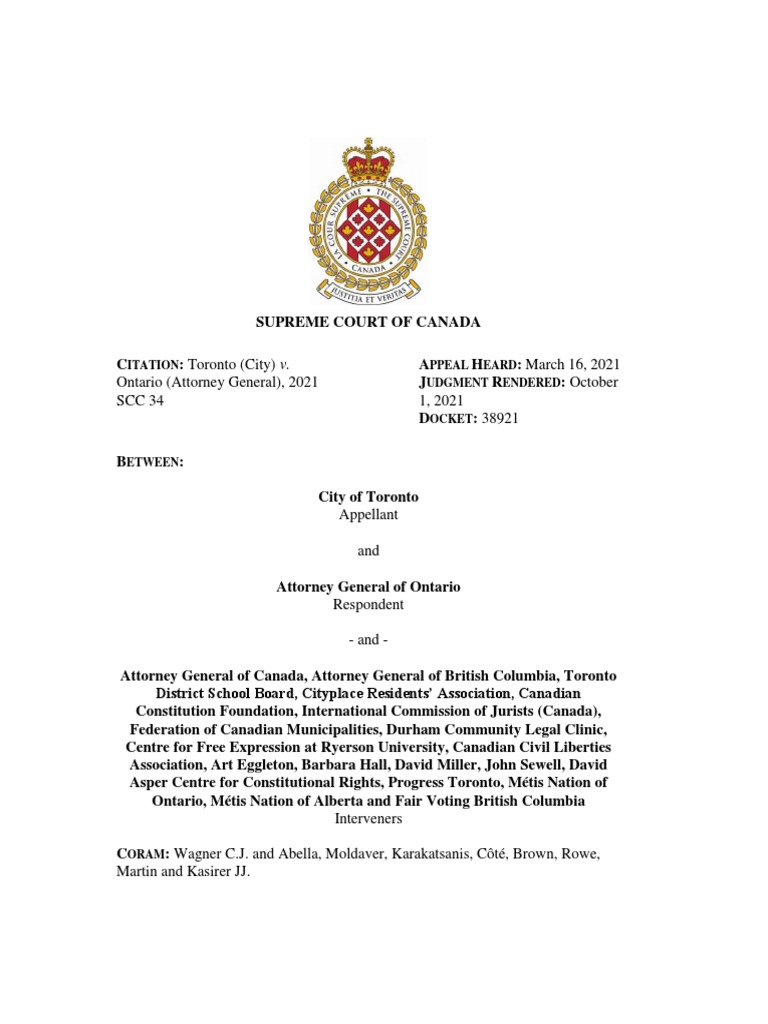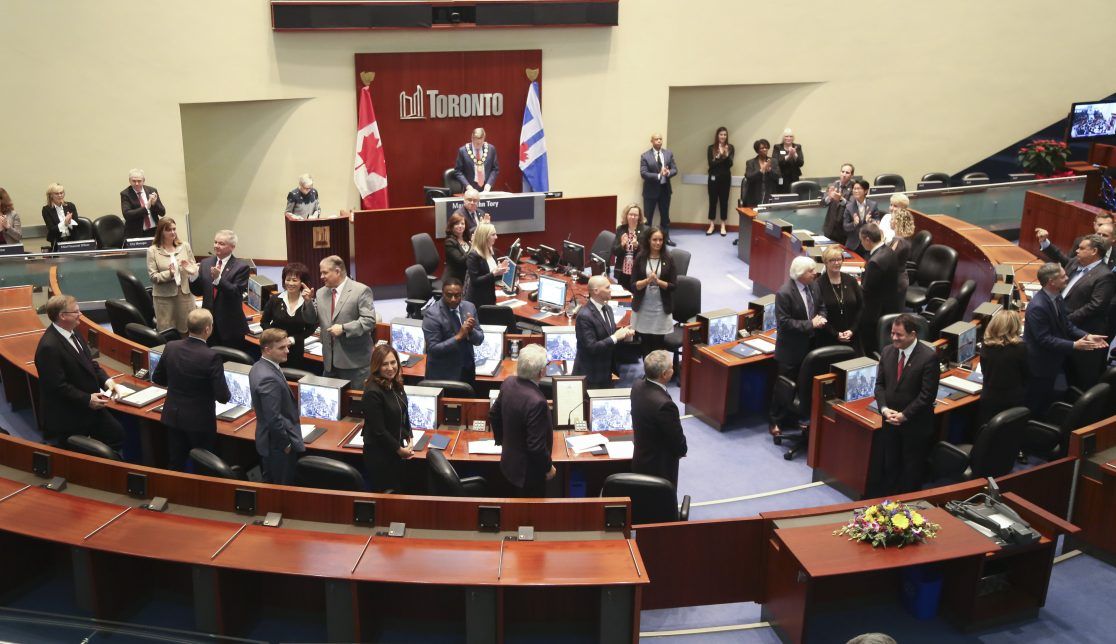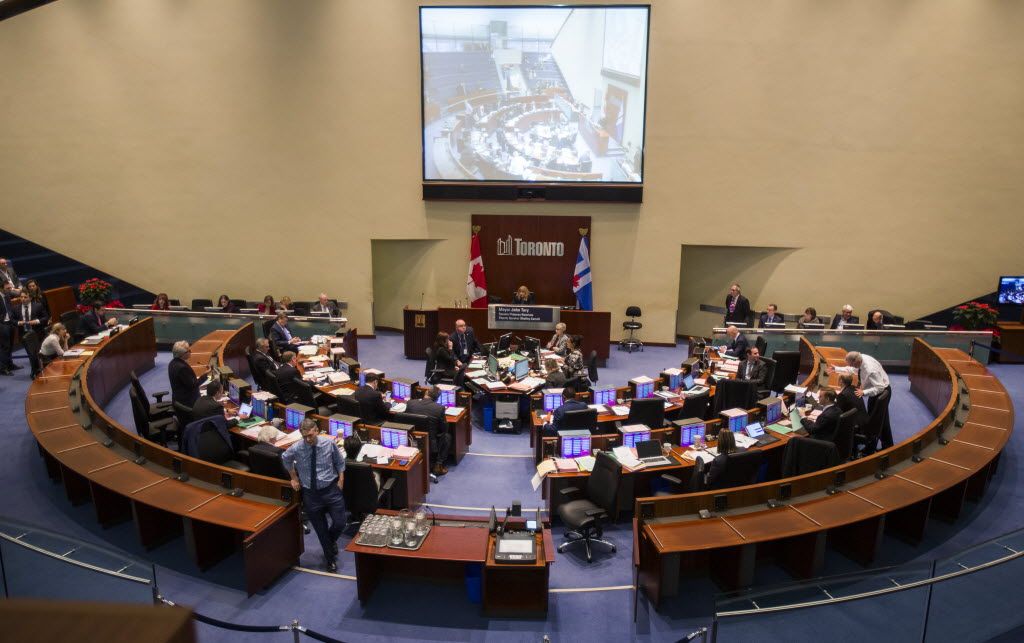Top court upholds Ontario law that slashed Toronto council
The majority of the justices found that residents had enough time to adjust to the new system before the October 2018 vote
Author of the article:Antonella Artuso
Antonella Artuso
Publishing date:Oct 01, 2021 • 15 hours ago • 2 minute read • 60 Comments
Mayor John Tory speaks to the media at the first meeting of Toronto city council on December 4, 2018.
Mayor John Tory speaks to the media at the first meeting of Toronto city council on December 4, 2018. PHOTO BY JACK BOLAND /Toronto Sun
Article content
A law enacted by the Doug Ford government to cut the size of Toronto city council in half has been upheld by the Supreme Court of Canada.
Advertisement
STORY CONTINUES BELOW
Article content
A majority opinion found that the law did not violate the freedom of expression of candidates and voters, and that the Constitution allows provinces to pass laws affecting municipalities without consultation.
The Ford government was challenged by the City of Toronto after it reduced the number of wards to 25 through the Better Local Government Act, which came into effect on Aug. 14 ahead of the Oct. 22 vote in 2018.
Ontario Municipal Affairs and Housing Minister Steve Clark said in a statement following the ruling that the government had been acting as promised to end a culture of waste and mismanagement by streamlining the process at the City of Toronto.
“We have never been afraid of making the tough decisions that deliver the best outcomes for Ontarians, and we’d encourage the City of Toronto to remain committed to this positive model moving forward,” Clark said.
Advertisement
STORY CONTINUES BELOW
Article content
Mayor John Tory thanked the Supreme Court for its decision to hear the case.
“I disagreed with the way the province went about changing the size of city council in the middle of the 2018 election and as mayor together with city council we have made that very clear all the way to our highest court,” Tory said in a statement.
Just prior to the ruling Friday, Tory explained that the city put this case forward because this action was “done wrong,” introduced during the middle of a municipal election without consultation.
Tory said he received a call from the province just the night prior to the introduction of the legislation.
“That didn’t strike me — and it still doesn’t — as the right way to go about very significant changes to our democratic process and our democratic institutions,” Tory said. “I am heartened by the fact this case reached the Supreme Court of Canada … This was deemed important enough to be heard.”
Advertisement
STORY CONTINUES BELOW
Article content
Councillor Josh Matlow tweeted that the decision upheld the 1867 Constitutional view of cities that they are “mere creatures of the province,” despite the fact that more than 80% of Canadians live in urban areas.
It’s time to empower cities to provide the local government residents expect, he said.
“This decision is disappointing and dangerous to our local democracy. Any provincial government now has license to interfere with an election if they don’t like the direction its heading. That’s banana republic rules. Toronto needs a city charter now,” Matlow tweeted Friday.
Advertisement
STORY CONTINUES BELOW
Article content
The Ontario Superior Court had earlier sided with the city.
Supreme Court Chief Justice Richard Wagner and Justice Russell Brown overturned that finding and dismissed the city’s appeal.
“The candidates and their supporters had 69 days — longer than most federal and provincial election campaigns — to re-orient their messages and freely express themselves according to the new ward structure,” the majority opinion said.
In a dissenting opinion, Supreme Court Justice Rosalie Abella said she would have allowed the city’s appeal, finding the law violated a section of the Charter that enshrines freedom of thought, belief, opinion and expression.
aartuso@postmedia.com
READ THE TOP COURT’S DECISION

 scribd.com
scribd.com

 torontosun.com
torontosun.com
The majority of the justices found that residents had enough time to adjust to the new system before the October 2018 vote
Author of the article:Antonella Artuso
Antonella Artuso
Publishing date:Oct 01, 2021 • 15 hours ago • 2 minute read • 60 Comments
Mayor John Tory speaks to the media at the first meeting of Toronto city council on December 4, 2018.
Mayor John Tory speaks to the media at the first meeting of Toronto city council on December 4, 2018. PHOTO BY JACK BOLAND /Toronto Sun
Article content
A law enacted by the Doug Ford government to cut the size of Toronto city council in half has been upheld by the Supreme Court of Canada.
Advertisement
STORY CONTINUES BELOW
Article content
A majority opinion found that the law did not violate the freedom of expression of candidates and voters, and that the Constitution allows provinces to pass laws affecting municipalities without consultation.
The Ford government was challenged by the City of Toronto after it reduced the number of wards to 25 through the Better Local Government Act, which came into effect on Aug. 14 ahead of the Oct. 22 vote in 2018.
Ontario Municipal Affairs and Housing Minister Steve Clark said in a statement following the ruling that the government had been acting as promised to end a culture of waste and mismanagement by streamlining the process at the City of Toronto.
“We have never been afraid of making the tough decisions that deliver the best outcomes for Ontarians, and we’d encourage the City of Toronto to remain committed to this positive model moving forward,” Clark said.
Advertisement
STORY CONTINUES BELOW
Article content
Mayor John Tory thanked the Supreme Court for its decision to hear the case.
“I disagreed with the way the province went about changing the size of city council in the middle of the 2018 election and as mayor together with city council we have made that very clear all the way to our highest court,” Tory said in a statement.
Just prior to the ruling Friday, Tory explained that the city put this case forward because this action was “done wrong,” introduced during the middle of a municipal election without consultation.
Tory said he received a call from the province just the night prior to the introduction of the legislation.
“That didn’t strike me — and it still doesn’t — as the right way to go about very significant changes to our democratic process and our democratic institutions,” Tory said. “I am heartened by the fact this case reached the Supreme Court of Canada … This was deemed important enough to be heard.”
Advertisement
STORY CONTINUES BELOW
Article content
Councillor Josh Matlow tweeted that the decision upheld the 1867 Constitutional view of cities that they are “mere creatures of the province,” despite the fact that more than 80% of Canadians live in urban areas.
It’s time to empower cities to provide the local government residents expect, he said.
“This decision is disappointing and dangerous to our local democracy. Any provincial government now has license to interfere with an election if they don’t like the direction its heading. That’s banana republic rules. Toronto needs a city charter now,” Matlow tweeted Friday.
Advertisement
STORY CONTINUES BELOW
Article content
The Ontario Superior Court had earlier sided with the city.
Supreme Court Chief Justice Richard Wagner and Justice Russell Brown overturned that finding and dismissed the city’s appeal.
“The candidates and their supporters had 69 days — longer than most federal and provincial election campaigns — to re-orient their messages and freely express themselves according to the new ward structure,” the majority opinion said.
In a dissenting opinion, Supreme Court Justice Rosalie Abella said she would have allowed the city’s appeal, finding the law violated a section of the Charter that enshrines freedom of thought, belief, opinion and expression.
aartuso@postmedia.com
READ THE TOP COURT’S DECISION
Supreme Court Ruling | PDF | Constitution | Political Science
Toronto (City) v. Ontario (Attorney General)

Top court upholds Ontario law that slashed Toronto council
The majority of the justices found that residents had enough time to adjust to the new system before the October 2018 vote
